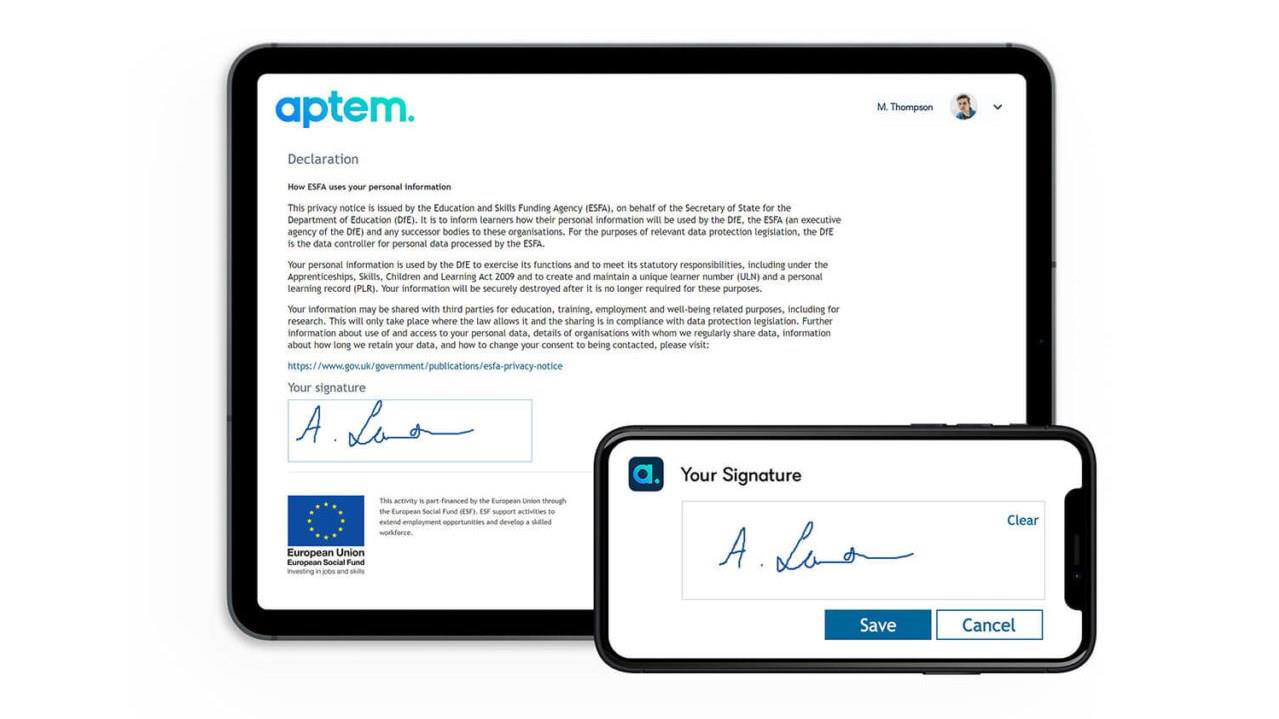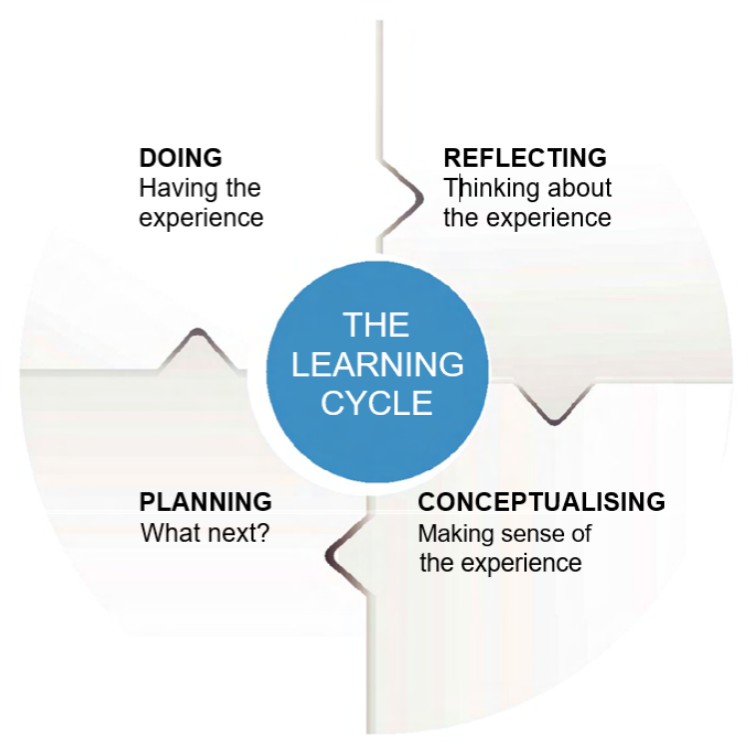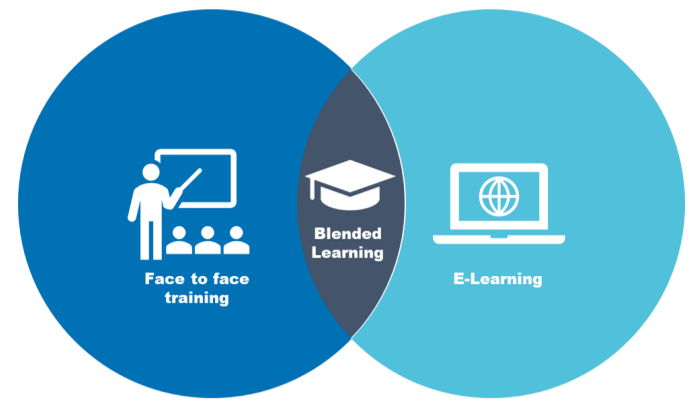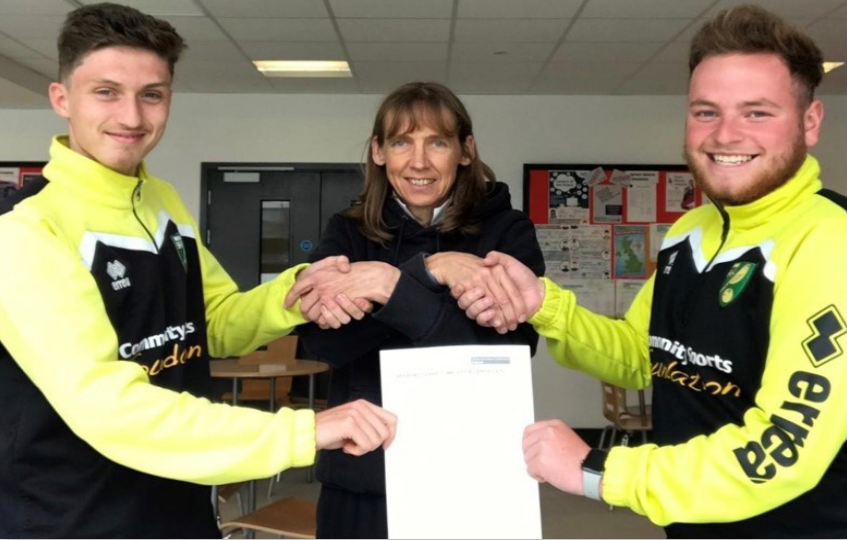
As a training provider we aim to ensure you receive comprehensive CIAG throughout your learning experience. This includes the different progression opportunities for further training, qualifications, and career development relevant to your work role and responsibilities. Throughout your apprenticeship you’ll receive learning is transferrable skills required to succeed in your professional life.
In this learner handbook you’ll see there is a ‘Useful Contacts’ section which provides a non-exhaustive list of support networks and resources available to you. In addition, there is a ‘Safeguarding Contacts List’ page which lists useful safeguarding organisations and support available to you.
Whatever your role, we will support your learning journey and help you with continuous development opportunities.
Our job, alongside helping you to achieve your apprenticeship, is to support you to grow and develop as a person, something that will support your career aspirations.
This can be achieved through raising awareness and knowledge of important topics and by developing soft skills that society and employers need.
To develop these skills, knowledge and behaviours, we will embed resources and activities into the apprenticeship programme. Named ‘enrichment’, we believe the activities enrich your learning experience and positively contribute to your own personal development. Information on some of these topics such as equality, diversity and inclusion, safeguarding and prevent are included in this handbook.
The onboarding and enrolment includes 3 distinctive stages; Onboarding, Pre-Enrolment Check and Enrolment.
Prior to the start of your Apprenticeship, you will complete the onboarding process. This will be completed on the Aptem e-portfolio, which you will use to undertake and submit work during your apprenticeship.
We will conduct initial assessments in maths and English to identify if Functional Skills qualifications are needed as part of your apprenticeship and a diagnostic in maths and English to show us any areas for improvement that we can support you with during your apprenticeship. In addition, we conduct a skills scan to identify any prior learning or achievements that may impact your training and to ensure we plan for your individual learning and support needs. These initial assessments give us a clear benchmark at the start of your apprenticeship which we use to create your individual learning plan (ILP).
After the onboarding and initial assessments, we will create an ILP that outlines the specific programme of learning you will undertake. It is tailored to reflect your strengths, your aspirations and your training and learning needs.
We will set expectations for the apprenticeship and confirm as part of our CIAG services that the apprenticeship is the right learning programme for you and all eligibility criteria has been met.
As part of the pre-enrolment check, both you and your manager will agree to; the accuracy of the skills scan, the suitability of the ILP, and an understanding of all commitments required for the apprenticeship. Once this has been completed, we will plan your enrolment
You will then be enrolled onto the programme and enter into the formal agreements between yourself, your employer, and us as your training provider. These agreements will confirm your start and planned end date, detail the plan of learning, and set out the expectations and responsibilities of each party.
It is important that you read and understand these compliance documents as they confirm your commitment and the terms and conditions of each party.
-
Training Plan: This is a signed agreement between you, your employer, and us as your training provider. It contains the responsibilities and commitments of each party and details of your Apprenticeship programme length, planned schedule for training and reviews.
-
Apprenticeship Agreement: This is a signed agreement between you and your employer confirmed before the start of the programme. This is a legal requirement and is used to confirm key details of your Apprenticeship and the employment arrangements between you and your employer.
-
Individual Learning Record ( L ): This is a record of your data collected during the onboarding and enrolment process and signed by you and us as your training provider. It is important that your data is kept up to date throughout your Apprenticeship as it is used to access Apprenticeship funding and to inform government statistics.
The first thing we do as part of your enrolment is to conduct a skills gap analysis to check any prior learning linked to the apprenticeship standard. This confirms eligibility and ensures we can tailor the programme to your requirements. In addition, we conduct initial assessments in Maths and English to identify if Functional Skills qualifications are needed as part of your apprenticeship. These initial assessments give us a clear benchmark at the start of your apprenticeship and allow us to arrange any further support for you, if necessary.
After initial assessments, we will create an individual learning plan that outlines the specific programme of learning you will undertake. It is tailored to reflect your strengths, your training and learning needs, your preferred learning styles and your aspirations and longterm goals.

We will introduce you to your e-portfolio Aptem, which you will use to undertake and submit work and track progress.

As part of the enrolment process, both you and your manager will agree to the ILP and confirm understanding of all commitments of the apprenticeship.
Everyone learns in different ways, but the process of learning typically follows a set process shown in the learning cycle:
By following the learning cycle, you will gain knowledge and develop new skills to support your apprenticeship and your wider career goals.

The apprenticeship standard is made up of knowledge, skills and behaviours.
Knowledge
The Apprenticeship standard will define the knowledge and understanding that you will need to acquire and apply to carry out your role effectively and to become occupationally competent. As your training provider, we will provide you with the taught elements of your Apprenticeship qualification.
Skills
The Apprenticeship standard will define the range of skills and competencies that you need to practise and acquire in order to do the job to a specified standard. These skills are largely acquired and practised in the workplace.
Behaviours
The Apprenticeship standard will define the behaviours that you will need to demonstrate to become occupationally competent. This may include behaviours such as leadership techniques, emotional intelligence, reflection, and valuing diversity.
Using an e-portfolio puts you in charge of your learning and helps you manage your own progress effectively.
Aptem is your e-portfolio system which sets out your individual learning plan and you will use this to collect evidence towards your Apprenticeship. During your time on programme, you will have remote access to your learning resources, activities, and assignments, plus you’ll submit evidence to confirm your competence as part of your programme requirements.
Your tutor/assessor will monitor and review your progress, mark work submitted, and provide you with feedback via Aptem.
The ILP will cover all areas of development within the apprenticeship, such as:
 |
Knowledge |
 |
Skills |
 |
Behaviours |
 |
English and maths skills |
 |
Digital literacy |
In addition, we will raise your knowledge and awareness of key enrichment themes such as:
 |
Safeguarding and prevent |
 |
Health and wellbeing |
 |
Fundamental British Values |
 |
Health and Safety |
 |
Equality, Diversity and Inclusion (EDI) |
 |
Personal and Social Development |
 |
Employability Skills |
To support your continued development, your programme of teaching and learning will include a variety of activities, such as:
 |
Group/workshop training sessions |
 |
Research projects |
 |
1-2-1 interaction with your Tutor/ Assessor |
 |
Written assignments |
 |
Task-based learning |
 |
Practice and reflection |
 |
Independent learning |
 |
Unique learning activities designed in collaboration with your manager |
We use a mixed approach to deliver our apprenticeships, tailoring the content to your learning style.

An important part of the learning cycle is ongoing assessment and feedback and throughout your apprenticeship there will be regular checks to ensure you have evidence of a practical understanding and application of all knowledge, skills and behaviours within your job role, which are aligned to criteria in the apprenticeship standard. The evidence required to meet the apprenticeship criteria can be requested in a number of methods, such as:













The work that you submit is the evidence of your understanding and knowledge against the criteria and can take many forms, for example, paper-based or digital documents, workbooks, photographs, videos or audio recording.
Your tutor will assess your work against the assessment criteria and provide you with feedback to highlight where you have performed well and to help you understand how you can improve. This feedback may be verbal in 1:1’s or sessions and may form the basis of future targets or it may be written feedback on work submitted so you can refer back to it.
You should have regular meetings with your line manager or mentor within your workplace to ensure that you are being provided with the right opportunities within the workplace to apply your newly learned Knowledge, Skills, and Behaviours.
Progress reviews are an integral part of the learning cycle. They are scheduled at 10-to-12-week intervals throughout the duration of your Apprenticeship.
You, your mentor or line manager, and tutor all take an active role in your progress reviews. Progress reviews provide an opportunity to discuss and reflect on how you have demonstrated Knowledge, Skills, and Behaviours within your job role, recognise your strengths and achievements, reflect on feedback, and review any challenges to identify areas for further development.
They should give you a clear understanding of your progress through your learning journey, identify any support needs, and agree and set targets for your future learning. The most effective targets are those which are SMART:

Off-the-job (OTJ) training is a statutory requirement for an apprenticeship and it is training, which is received by the apprentice, during the apprentice’s normal working hours, for the purpose of achieving new learning that supports the development of knowledge, skills and behaviours that directly link to the apprenticeship standard and your job role. Each apprentice must spend about 20% of their contracted time (a minimum of 6 hours a week) on OTJ training and some of this may be completed with your line manager or mentor.
Your employer must ensure you are allowed time to complete this requirement and we will guide and support you and your line manager/mentor to identify and record suitable activities.
 |
Teaching of theory e.g. workshop sessions, lectures, role play, simulation exercises and online learning. |
 |
Practical training e.g. shadowing, mentoring, industry visits and participation in competitions (all of which could be done with staff such as your line manager/mentor). |
 |
Learning support and time spent completing assessments and assignments. |
 |
Initial assessment and onboarding activities. |
 |
Study required in connection with achieving separate English and maths qualifications. |
 |
Training to acquire knowledge, skills and behaviours that are not required by the apprenticeship standard. |
 |
Progress reviews. |
 |
Examinations and other testing (e.g. on-programme assessments linked to a qualification and mock EPA testing). |
 |
Training which takes place outside the apprentices normal working hours. |
Your ILP will set out the excepted learning, and this will be shown on Aptem. As part of our quality and compliance processes, learner progress is tracked and measured to ensure learners are being supported to develop.
Progress reports can be shared with managers and employers on request. At Sport Structures we expect high standards of all our staff and where learners are making insufficient progress, we may flag this and put an action plan in place to address it.
We are committed to continual improvement of our apprenticeship programmes for the benefit of all of our learners, and we have a robust quality assurance strategy in place to support this, with processes including:
 |
Observations of Teaching, Learning and Assessment |
 |
Evidence sampling |
 |
Interviews |
 |
Surveys |
OTLAs are conducted to ensure our Tutor/Assessors are offering the best possible teaching or assessment experience to you as a learner.
If someone from our quality assurance team wants to observe a session they will always check with a learner before attending.

Our quality assurance team will sample evidence submitted to ensure it is robust and meets requirements. This is especially important when reviewing evidence that will be used for assessments in the EPA process.
Sampled material can include: progress reviews, OTJ logs, teaching and learning evidence, functional skills evidence or any evidence as part of a value added qualification.
In-depth interviews with learners and employers are conducted periodically by our quality assurance team and governors to gain feedback on the quality of our apprenticeship provision.
We share surveys with learners, employers and staff involved in our apprenticeship delivery to gain further feedback and identify strengths and areas for improvements. We encourage you to complete any surveys we send as it will be used to support you and other learners in the future.
All feedback we receive is collated and shared with staff to identify best practice and shape any training required.
Standardisation sessions are held to ensure consistency in our delivery and to drive improvements.
As you approach Gateway your tutor/assessor will support you in preparing for your End-Point Assessment (EPA). Gateway takes place before an EPA can start. Your line manager/mentor and tutor/assessor will decide when they think you are ready for EPA.
A Gateway Review will take place towards the end of the Apprenticeship programme and marks the completion of the practical period of teaching and learning. During your Gateway Review your line manager/mentor and tutor will discuss your Knowledge, Skills and Behaviours and confirm if you have met the minimum requirements of the Apprenticeship set out in the Apprenticeship standard to demonstrate that you are ready to take the assessment.
The Gateway Review is also an opportunity to express your views about whether you feel ready to pass through Gateway and to voice any concerns you might have about undertaking your EPA. It is important that you do not pass through Gateway until you understand all the different assessment methods and feel confident that you are ready.
The below points will be completed at this stage:
 |
Complete prescribed EPA documents for End Point Assessment Organisations (EPAO) |
 |
Employer and provider agree the apprentice has completed the programme assessment, holding knowledge and skills to demonstrate the necessary behaviours to progress to EPA |
EPA is the final stage of an Apprenticeship. It is an impartial assessment of whether you have developed the Knowledge, Skills and Behaviours outlined in the Apprenticeship standard.
Each Apprenticeship standard has its own ‘Assessment Plan’ which details the criteria required to successfully achieve your Apprenticeship and the grade you may receive (e.g. Pass, Merit, Distinction).
EPA methods can include:








The End Point Assessment Organisation (EPAO) will agree and confirm a date for your EPA to take place. The period in between the Gateway Review and the confirmed EPA date will be used to consolidate your learning.
If you do not pass one or more assessment method at EPA, then you will be provided the opportunity to take a resit or retake, and this may incur a cost to your employer.
Where a resit or retake has been recommended, your tutor/assessor will work with you to put together an action plan to support you to improve on the areas identified in the assessment feedback and will provide you with further training where required.
You can only retake or resit at the request of the EPAO from the results of your EPA. You cannot request a retake or resit to improve your grade if you have passed.
Our Appeals Procedure covers the process for raising appeals against an academic decision that has been made.
Malpractice is any activity or practice which deliberately contravenes regulations and compromises the integrity of the internal or external assessment process and the validity of certificates.
If you are unsure of where to find copies of our procedures, please speak with your tutor/assessor.

The EPAO will confirm your grade and once you have successfully passed your EPA and completed your Apprenticeship you will receive your certificate.
